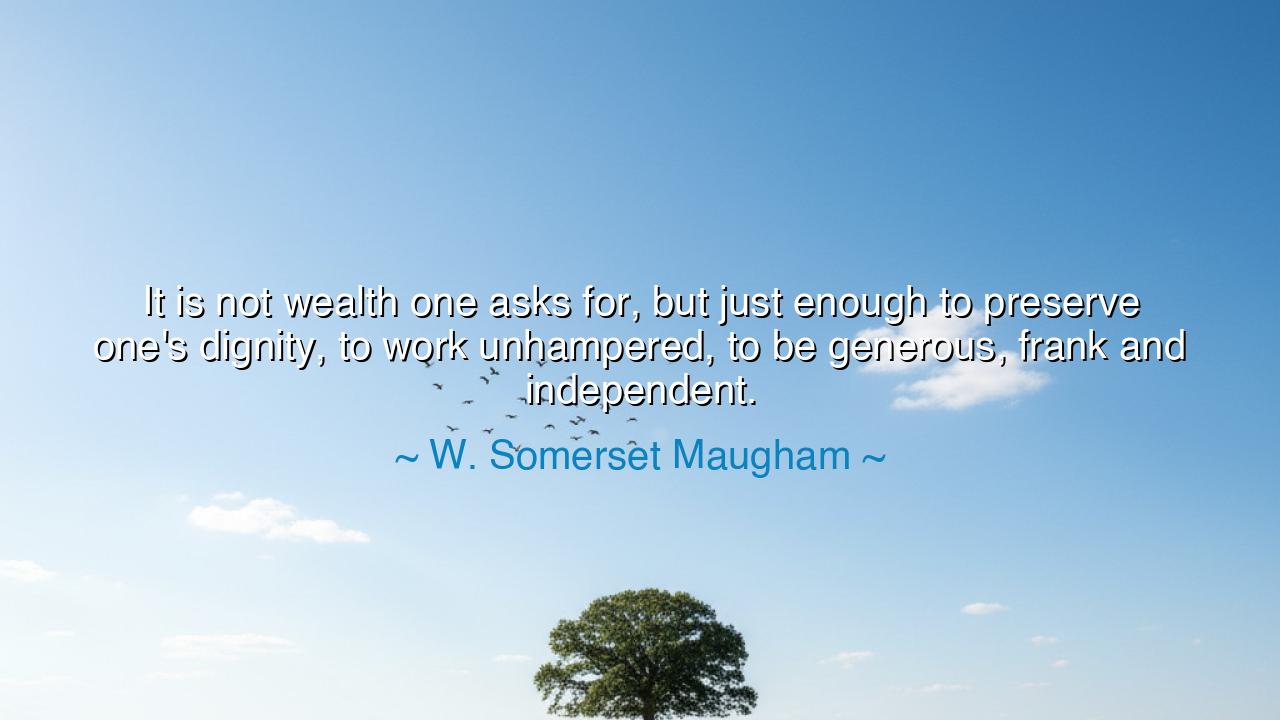
It is not wealth one asks for, but just enough to preserve one's
It is not wealth one asks for, but just enough to preserve one's dignity, to work unhampered, to be generous, frank and independent.






Listen, O children, to the wisdom of W. Somerset Maugham, whose words echo the very essence of what it means to live a life of true fulfillment: "It is not wealth one asks for, but just enough to preserve one's dignity, to work unhampered, to be generous, frank and independent." These words speak to the heart of human longing—a longing not for luxury or excess, but for the simple, profound power of dignity and freedom. In a world driven by the pursuit of wealth, Maugham reminds us that true happiness does not lie in the accumulation of riches, but in the ability to live with integrity, to work with purpose, and to be generous in spirit.
The desire for wealth is often seen as the highest aspiration, the ultimate goal of human endeavor. Yet Maugham’s words remind us that the pursuit of wealth can be a hollow one, if it leads us to sacrifice our dignity and the freedom to live authentically. Wealth does not guarantee happiness, and in many cases, it becomes a burden that robs us of the very things that make life worth living. To preserve one’s dignity is to live in alignment with one’s true self, to be free from the shackles of greed and excess, and to remain grounded in the values that define us as individuals. The richest life is not necessarily the one with the most possessions, but the one where a person can walk with head held high, free from the compromises and compromises that wealth often demands.
Consider, O children, the example of Mahatma Gandhi, whose life was not defined by riches or luxury, but by the unwavering commitment to dignity and freedom. Gandhi was a man of simple means, choosing to live with little, yet his influence on the world was immeasurable. In his struggle for Indian independence, he was neither swayed by the lure of personal gain nor distracted by the pursuit of wealth. Instead, he chose to live a life of simplicity, grounded in the principles of truth, justice, and nonviolence. Gandhi's life reminds us that the power of dignity and independence is far greater than the fleeting allure of wealth. His example shows that true greatness comes not from what one owns, but from the strength of character and the courage to remain true to one's values.
Likewise, consider the story of Frida Kahlo, the renowned artist whose work and life were deeply intertwined with the themes of independence and generosity. Despite physical suffering and personal tragedy, Kahlo never sought the comforts of wealth, but instead created a space for herself where she could work without the constraint of external expectations. Her paintings, vibrant with emotion and raw honesty, were not created for fame or fortune, but as an expression of her dignity and unique vision. She was generous with her soul, sharing her inner world with the world, unhampered by the societal pressures to conform or conform to the expectations of wealth and status. Kahlo's life is a powerful testament to the idea that one can live with richness of spirit even if the material world offers little.
In the pursuit of a fulfilling life, O children, Maugham's wisdom calls us to strike a balance. We need not reject wealth, but we must remember that wealth should not be the central pursuit of our lives. Instead, we must seek enough—enough to maintain dignity, to live without the pressure of financial insecurity, and to have the freedom to work and create as we see fit. True independence comes not from the accumulation of riches, but from the freedom to live a life that reflects our values, to make decisions based on what is right and just, and to be generous with the talents and resources we have, regardless of how large or small they may seem.
The lesson, O children, is clear: dignity, freedom, and independence are the true treasures of life. While the pursuit of wealth may seem alluring, it is the pursuit of personal integrity and authenticity that will bring lasting fulfillment. Let us, then, seek enough—enough to live with dignity, to work with purpose, and to contribute to the world around us with generosity and honesty. Let us embrace independence, not as a rejection of others, but as the freedom to make choices that are true to ourselves and our values. In doing so, we will find that the riches we seek are not found in material possessions, but in the strength to live as we truly are, and in the power to share our gifts with others freely and without restraint.
Therefore, O children, as you move forward in life, remember the wisdom of Maugham and those who have come before you. Strive not for excess, but for enough—enough to preserve your dignity, to live unhampered, and to be generous, frank, and independent in all that you do. In this pursuit, you will find a life far richer than any material wealth could offer, and a freedom that will sustain you through all the seasons of life.






AAdministratorAdministrator
Welcome, honored guests. Please leave a comment, we will respond soon